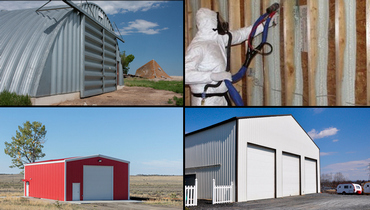Spray Foam Insulation
Spray Foam Roofing
Industrial Coating
CALL 306 537 9529
for a FREE Consultation and Estimate
Tell me about the project you're working on, and I'll get back to you with expert solutions that fit your needs.
How Can We Help You?
Our Services
Spray Foam Insulation
- Lower energy bills & prevent heat loss
- Eliminate drafts for a cozy home
- Safe and durable
- For homes, shops, barns, and more
Polyurethane Coatings
- Impact resistant
- Chemical & corrosion resistant
- Piping, vessels, trailers, floors and walls, truck beds, bridges & structures
A FEW REASONS WHY YOU SHOULD CHOOSE US FOR YOUR NEXT SPRAYFOAM PROJECT
EXPERIENCE
INSULATION JOBS
ROOF JOBS
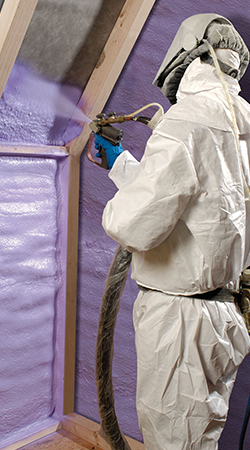
What Sets Us Apart
Why Choose ProFoam Insulators?
Commitment To Customer Satisfaction
Your satisfaction is our top priority.
We are dedicated to providing outstanding customer service, from your initial consultation to the completion of the job.
Our team is professional, friendly, and ensures you fully understand each step of the spray foam process, so you feel confident and comfortable every step of the way.
Experienced and Qualified Spray Foam Experts
With over a decade of experience, we’ve worked on projects of all sizes—from homes to office buildings. We’re continuously upgrading our skills, and use the latest technology, products, and equipment.
Our extensive experience and expertise enables us to provide the right solutions tailored to your needs, ensuring you get the results you want.
Transparent Pricing and Honest Advice
We believe in transparent pricing with no hidden fees, ensuring you know exactly what to expect from start to finish.
Our team provides honest, straightforward advice, guiding you through the process and offering solutions that best fit your needs.
With us, you can trust that you’re getting fair, reliable service every time.

Year-Round Comfort Starts Here!
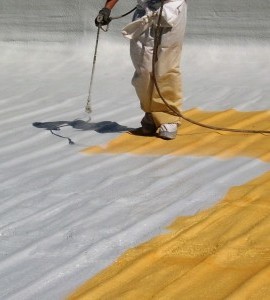
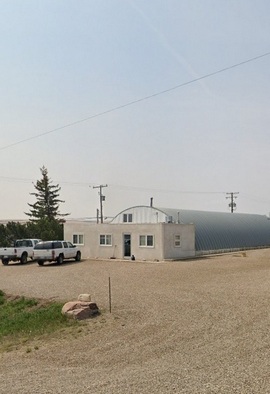
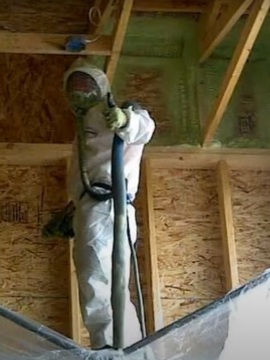

Commitment You Can Count On
A Message from Our Founder
At ProFoam Insulators, we believe trust is earned—through honest work, real expertise, and a commitment to doing right by our customers. From day one, our goal has been simple: provide top-quality spray foam insulation with professionalism and integrity.
Insulation isn’t just about energy savings—it’s about comfort, efficiency, and protecting what matters most. That’s why we take the time to understand your needs, offer straightforward advice, and deliver results that last. We don’t cut corners, we don’t upsell unnecessary services, and we always stand behind our work.
Here’s what you can expect from us:
✅ Honest Assessments – We recommend solutions that fit your needs, not our bottom line.
✅ Quality Workmanship – Every job is done with precision and care.
✅ Reliability – On time, prepared, and ready to get the job done right.
✅ Respect for Your Property – Clean, professional, and no mess left behind.
✅ Guaranteed Satisfaction – We stand by our work so you can have peace of mind.
When you choose ProFoam Insulators, you’re not just hiring a contractor—you’re choosing a team that values your trust. We’re proud of the work we do, and we’d love the opportunity to show you the difference quality and integrity can make.

Curtis Pilat
Founder, ProFoam Insulators
Swift Current, SK

Call for a Free
Consultation!
306 537 9529
Frequently Asked Questions
Spray Foam Insulation FAQ's
Is spray foam insulation really worth the cost?
Yes! While the upfront cost is higher than fiberglass or cellulose, spray foam provides superior energy efficiency, cutting heating and cooling costs by up to 50%. Over time, these savings help the insulation pay for itself.
Why is spray foam more expensive than other insulation?
Spray foam is a high-performance insulation that not only insulates but also seals air leaks and acts as a moisture barrier. The cost reflects its multi-purpose benefits and long lifespan, unlike fiberglass, which can degrade and need replacing.
How do I choose the right spray foam contractor?
When choosing a contractor, look for proper certifications, extensive experience in jobs – big and small – and a company that backs up their work. Always ask for references and check reviews to ensure quality workmanship. Ask if it’s possible for you to tour an active worksite to see the quality of workmanship firsthand, and if they are professional/courteous to their clients.
ProFoam Insulators are licensed, insured, and certified, with over a decade’s experience in the spray foam insulation and roofing business in Saskatchewan.
Will the insulation last, or will I need to replace it?
Spray foam never sags, settles, or deteriorates like other kinds of insulation. It’s a permanent solution that keeps your home insulated for life.
What if something goes wrong after installation?
If there’s ever an issue, we’ll fix it—no hidden fees, no hassles. We take great pride in doing the job right the first time!
Is spray foam insulation safe for my family and pets?
Absolutely! We use low-VOC, non-toxic spray foam that is safe once cured. We also follow industry safety standards to ensure proper ventilation during installation.
Does spray polyurethane foam burn?
Spray polyurethane foam is an organic material and all organic materials burn. Polyurethane spray foam contains a fire retardant so that the flame spread is less than 500 when tested in accordance with CAN/ULC S102 and specimens prepared in accordance with the requirements of the National Building Code.
I’ve heard spray foam releases chemicals—should I be worried?
Many building materials, like wood varnish, flooring adhesive, fresh paint, etc, give off fumes when first applied.
Similarly, spray foam insulation emits minimal gases only during installation. After a short curing period (typically 24 hours), it’s completely safe.
Can spray foam cause moisture or mold issues?
No! Properly applied closed-cell spray foam actually prevents moisture buildup by sealing gaps where condensation could form. This helps keep mold and mildew at bay.
How much will I save on my energy bills?
It depends on the how well your home was insulated before, and if you spray foam all the critical areas, like rim joist gaps in the basement, the attic, windows, etc.
Most homeowners see 20-50% savings on heating and cooling costs after switching to spray foam.
Of course, if you are building a new home, it’s better to start with spray foam insulation right from the start.
Does spray foam make a noticeable difference in comfort?
Absolutely! You’ll feel consistent temperatures throughout your home, no more drafts, and even less noise from outside.
Can spray foam improve my home’s resale value?
Yes! Buyers love energy-efficient homes, and spray foam can increase your home’s market value while making it more attractive to eco-conscious buyers.
Will my home be a mess during installation?
Our team takes care of everything, from prepping and protecting your space to a thorough cleanup afterwards. You won’t have to lift a finger!
How long does installation take?
Most homes can be fully insulated in one day, but it depends on the project size and complexity of the house design.
Do I need to leave my home during installation?
We recommend staying elsewhere for 24 hours to allow the foam to fully cure and ventilate. After that, your home is safe and better insulated than ever!
SPF Polyurethane Roofing FAQ's
Does SPF roofing require a lot of maintenance?
No! SPF roofs are seamless, waterproof, and resistant to leaks, requiring minimal maintenance compared to traditional roofs. An occasional inspection and recoating every 10-20 years can extend its lifespan indefinitely.
Is SPF roofing more expensive than traditional roofing?
While the upfront cost may be higher than some traditional roofing materials, SPF roofing lasts longer, provides superior insulation, and reduces energy costs by up to 30%, making it a cost-effective investment over time.
How long does an SPF roof last?
With proper installation and maintenance, an SPF roof can last 30+ years, outperforming many traditional roofing materials. Regular re-coating extends its lifespan even further.
Can an SPF roof handle extreme weather?
Absolutely! SPF roofing is highly durable, resistant to hail, wind, and heavy rain, and even helps protect against thermal expansion and contraction, reducing cracks and leaks.
Will SPF roofing hold up to foot traffic?
Yes, but high-traffic areas may require additional protective coatings or walkways to prevent damage.
How long does SPF roofing take to install?
Most installations take 1-3 days, depending on the roof size. Since it’s spray-applied, it conforms to any roof shape with minimal disruption.
Can SPF roofing be installed over my existing roof?
Yes! SPF can often be applied directly over metal, asphalt, concrete, or single-ply roofs, reducing tear-off costs and landfill waste.
Will installation create a mess or disrupt my business/home?
SPF roofing is a quick, low-waste installation with minimal disruption. There’s no need for heavy materials, loud hammering, or major demolition.
How does SPF roofing improve energy efficiency?
SPF has a high R-value (6.5 per inch), creating a seamless, insulated barrier that reduces heating and cooling costs by up to 30%.
Is SPF roofing environmentally friendly?
Yes! SPF roofs are lightweight, reduce material waste, and improve energy efficiency, leading to a lower carbon footprint. Plus, they reduce landfill waste since they can be recoated instead of replaced.
Will an SPF roof help keep my building cooler in summer?
Yes! The reflective topcoat reduces heat absorption, keeping your building cooler in summer and reducing AC costs.
Is SPF roofing safe and non-toxic?
Yes! Once cured, SPF is completely safe and does not release harmful fumes. During installation, we follow strict safety protocols to ensure proper ventilation.
Can SPF roofing prevent leaks and water damage?
Yes! Unlike traditional roofs with seams and fasteners, SPF forms a seamless, waterproof barrier, preventing leaks and standing water issues.
Will SPF roofing trap moisture and cause mold issues?
No! Properly applied SPF roofing is moisture-resistant and eliminates gaps where mold could grow, making it an excellent choice for humid or wet climates.
The Next Step
Give me a call
and tell me about your project! We’ll discuss what you’d like to achieve, and I’ll give you my best recommendations for you to reach your goal.
No obligations, we’ll just chat.
Your Custom Proposal
If you choose to proceed, we’ll research your requirements and provide a price quote with a clear, customized proposal tailored to your goals.
We’ll get to work
Once you give the green light, we’ll handle the logistics, coordinate schedules and get to work — executing the plan to deliver a job you’ll be proud of.
CALL 306 537 9529
Helpful Information
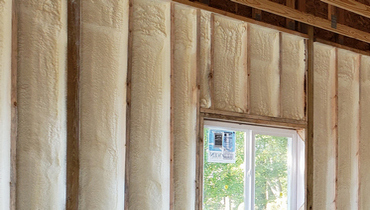
Understanding the insulation R-Value
How to Choose the Best Insulation for Your Saskatchewan Home

Spray Foam Insulation and Mice
How to Rodent-Proof Your Prairie Home with Spray Foam and Smarter Sealing

Scheduling Roof Maintenance and Inspections
How to schedule commercial roof maintenance and inspections

Protecting Your Flat or Low-Slope Roof
Prevent damage, extend its life, and avoid costly repairs

